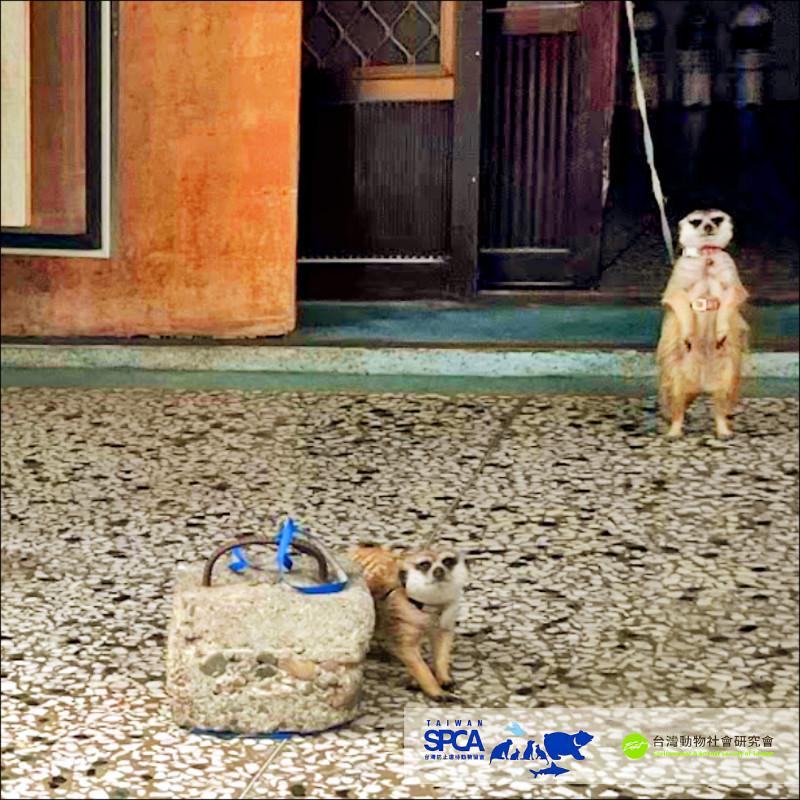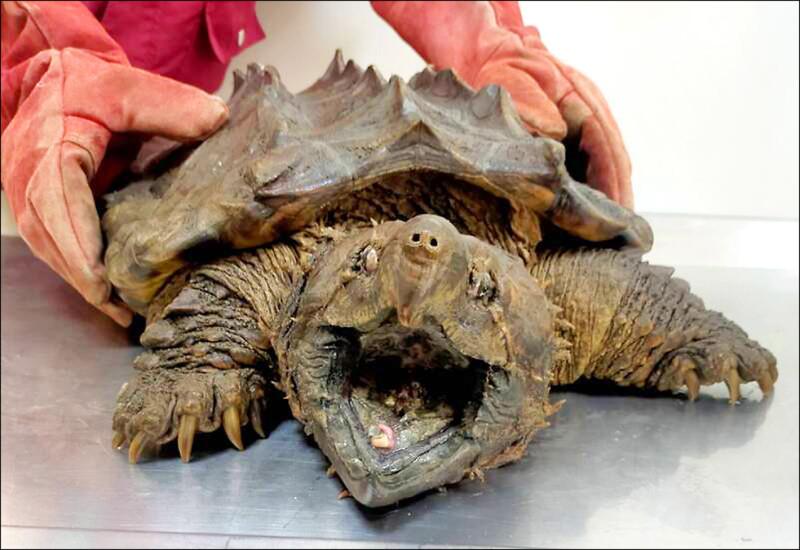Proposed exotic pet regulations in Taiwan would require owners to register animals such as meerkats, snapping turtles, caimans and pythons, while banning private breeding, the Ministry of Agriculture (MOA) said yesterday.
The new rules were broadly outlined during a meeting held by the MOA's Department of Animal Welfare with representatives of animal protection groups, pet owners, related businesses, scholars and experts earlier in the day.
To legally own meerkats, snapping turtles, caimans and pythons as pets in the future, owners would have to fulfill ownership conditions and register their pets with the government, Chen Chung-hsing (陳中興), deputy director of the department, said to the media after the meeting.

Photo: Taipei Times
Owners would also be prohibited from breeding the animals privately, he added.
In addition, sellers and professional breeders would be required to obtain government approval, provide facilities that comply with legal standards and pass non-scheduled inspections carried out by their respective local governments, Chen said.
Details of the new rules and how they are to be implemented going forward would be discussed at later meetings, he added.

Photo courtesy of Environment and Animal Society of Taiwan
However, the official gave no timeline for the implementation of the policy.
Chen also responded to an online statement released Tuesday, in which the Taiwan Society for the Prevention of Cruelty to Animals and the Environment and Animal Society of Taiwan criticized the department's inclusion of meerkats on its "grey list."
Currently, Taiwanese law only regulates the import and quarantine of meerkats, but once placed on the grey list, they can be legally kept, bred and traded under a set of enforceable provisions.

Photo courtesy of New Taipei City Government Animal Protection and Health Inspection Office
Citing the popularity of meerkats from films and animation, the groups argued that the move could drive demand, fueling illegal trade and poor care, and urged a total ban instead.
Chen said that since some people already keep the animal as pets, a total ban is "incompatible with the status-quo."
He argued that by including meerkats in the new policy, owners and the industry can be better managed and improvements made more effective, leading to improved animal welfare.

Beijing could eventually see a full amphibious invasion of Taiwan as the only "prudent" way to bring about unification, the US Department of Defense said in a newly released annual report to Congress. The Pentagon's "Annual Report to Congress: Military and Security Developments Involving the People's Republic of China 2025," was in many ways similar to last year’s report but reorganized the analysis of the options China has to take over Taiwan. Generally, according to the report, Chinese leaders view the People's Liberation Army's (PLA) capabilities for a Taiwan campaign as improving, but they remain uncertain about its readiness to successfully seize

Taiwan is getting a day off on Christmas for the first time in 25 years. The change comes after opposition parties passed a law earlier this year to add or restore five public holidays, including Constitution Day, which falls on today, Dec. 25. The day marks the 1947 adoption of the constitution of the Republic of China, as the government in Taipei is formally known. Back then the Chinese Nationalist Party (KMT) governed China from Nanjing. When the KMT, now an opposition party in Taiwan, passed the legislation on holidays, it said that they would help “commemorate the history of national development.” That

Taiwan has overtaken South Korea this year in per capita income for the first time in 23 years, IMF data showed. Per capita income is a nation’s GDP divided by the total population, used to compare average wealth levels across countries. Taiwan also beat Japan this year on per capita income, after surpassing it for the first time last year, US magazine Newsweek reported yesterday. Across Asia, Taiwan ranked fourth for per capita income at US$37,827 this year due to sustained economic growth, the report said. In the top three spots were Singapore, Macau and Hong Kong, it said. South

Snow fell on Yushan (Jade Mountain, 玉山) yesterday morning as a continental cold air mass sent temperatures below freezing on Taiwan’s tallest peak, the Central Weather Administration (CWA) said. Snowflakes were seen on Yushan’s north peak from 6:28am to 6:38am, but they did not fully cover the ground and no accumulation was recorded, the CWA said. As of 7:42am, the lowest temperature recorded across Taiwan was minus-5.5°C at Yushan’s Fengkou observatory and minus-4.7°C at the Yushan observatory, CWA data showed. On Hehuanshan (合歡山) in Nantou County, a low of 1.3°C was recorded at 6:39pm, when ice pellets fell at Songsyue Lodge (松雪樓), a